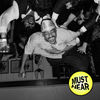Dijon Is Daddy
The musical omnivore’s outrageously great (and horny and wrenching) second album ‘Baby’ scrambles pop convention as it pays loving tribute to his wife and young son.

When I interviewed Dijon Duenas around the release of his audaciously raw debut album, 2021’s Absolutely, I was struck by his mix of cutting self-deprecation and astronomical ambition. He was suspicious of his own viral success—the second song he ever wrote, a lovestruck toe-tapper called “Skin,” was randomly funneled onto indie playlists and collected tens of millions of streams—and didn’t feel like he had yet put in the work required to be legitimately great. At the same time, he clearly had an intense drive to be legitimately great. He spoke about hopes and goals that most up-and-coming artists would be too timid to think, let alone say to a journalist. He wanted to help artists as big as Beyoncé adopt the seat-of-the-pants production style he and his friends (including a then-little-known guitarist named Michael Gordon, aka Mk.gee) put to such brilliant use on Absolutely. He looked forward to creating a new pop paradigm, citing his hero Prince as well as game-changing records like Radiohead’s Kid A and D’Angelo’s Voodoo. “You gotta go ass-out,” he told me. “That’s why I’m so hard on myself, because I know I have to dig in. I know where I’m at and I know where I think it could be. I always tell people, ‘Give me five years, I guarantee it will be batshit.’”
Almost four years after that conversation, Dijon is making good on his promise. Absolutely’s impact stretched wide and deep, calibrating ears for Mk.gee’s radical 2024 breakthrough, Two Star & the Dream Police. Earlier this year, Dijon collaborated with one of his idols—and a lodestar for those looking to crack through to the mainstream while keeping their cred, and soul, intact—Bon Iver’s Justin Vernon. Though he hasn’t worked with Beyoncé (yet), his name was all over the credits for Justin Bieber’s most stripped-down, no-bullshit album to date, last month’s Swag. So yes, Dijon is really doing it, shifting the sound of pop at its highest levels. He continues that pursuit with maniacal fervor on his second album, Baby.
This is music for falling in love, for holding onto it, for fucking, for modern masculinity, for fatherhood, for questioning the reason you were put on this Earth in the first place. It’s the raucous spirit of Ol’ Dirty Bastard transmitted through Jodeci and Bruce Springsteen. It’s a seance for Prince where Jai Paul and Old Kanye spell out “YAMAHA” on the Ouija board. To borrow a word, it is batshit—in the most glorious possible way.





